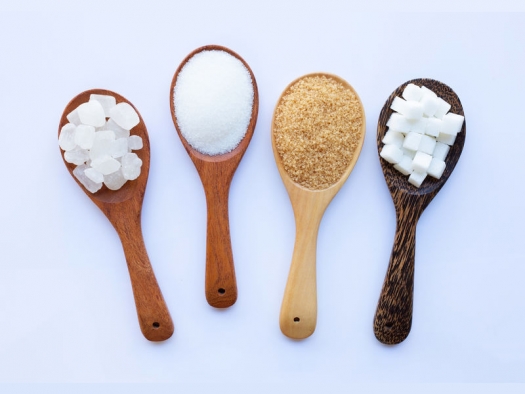SugarFourSpoonfuls.jpg

Photo by Bowanpat Sakaew / 123rf.com
Stroll down the aisles of just about any grocery store and you’re bound to see a plethora of products claiming to be “sugar-free” or “low-sugar.” These products claim to cater to “health conscious” individuals looking to cut back on their sugar intake without having to give up their sweet tooth.
These sugar substitutes play on consumers’ trust that “sugar-free” also means “healthy” and that these highly palatable sweet-tasting treats come without any of the negative side effects of sugar. But, as they say, when something sounds too good to be true, it usually is.
So, today we’re going to dive into two of the most popular sugar substitutes – artificial sweeteners and sugar alcohols. We’ll look at exactly what these sugar swap-ins are, how they affect your body, and whether or not they’re truly safe.
What are artificial sweeteners?
Artificial sweeteners are technically defined as a type of food additive or chemical designed to duplicate the taste of sugar while contributing virtually zero calories. But how exactly are the chemicals in artificial sweeteners able to satisfy your sweet tooth minus the calories?
Artificial sweeteners are composed of molecules that essentially mimic sugar – allowing them to bind to the receptors on your taste buds that signal to your brain that you’re tasting something sweet.1 And while these molecules are similar enough to sugar to taste sweet, they’re not quite similar enough for your body to be able to break them down into a significant amount of calories.
Artificial sweeteners are also sometimes referred to as “high-intensity sweeteners” thanks to their concentrated dose of sweetness – often being hundreds of times sweeter than table sugar. That means it requires a much smaller amount of artificial sweeteners than sugar to achieve the same amount of flavor.
What are some examples of artificial sweeteners?
Some common artificial sweeteners that you’ll find both as stand-alone sweeteners and on the ingredients list of many “diet” food and beverages include:2
- Aspartame: also sold as Equal or Nutrasweet
- Acesulfame potassium: also sold as Sweet One or Sunnet
- Saccharin: also sold as Sweet N’ Low, or NectaSweet
- Sucralose: also sold as Splenda
This artificial sweeteners list is not comprehensive – these are simply the ones you’re most likely to come across.
While these artificial sweeteners may be approved for use by the FDA and commonly sold in products that you can find at just about any grocery store, these tasty chemicals have another side that’s not so sweet.
Possible health side effects of artificial sweeteners
While these artificial sugar swap-ins have some sweet-sounding names, the question is – are artificial sweeteners safe? Research has revealed that artificial sweeteners may:3,4,5
- Disrupt gut health: Since your body can’t break down artificial sweeteners, these compounds can wreak havoc on your gut health – decimating beneficial gut flora, promoting “bad” bacterial overgrowth, and damaging the integrity of your gut lining.
- Interfere with satiety hormones: Our brains are wired to crave sweet food – so the more sweet-tasting food you eat, the more your brain signals you to eat. Providing your body with the ultra-sweetness of artificial sweeteners without the calories can interfere with the hormones that tell your brain when you’re full and it’s time to stop eating.
- Imbalance blood sugar and insulin levels: Artificial sweeteners have been shown to dysregulate blood sugar and insulin levels – leading to an increased risk of insulin resistance and Type 2 diabetes.
- Cause weight gain: Although it may seem counterintuitive that a “diet” food causes weight gain, it’s the truth. Thanks to artificial sweeteners’ ability to damage gut health, disrupt satiety hormones, and increase insulin resistance, these sugar substitutes have been directly linked with weight gain and an increased risk of obesity.
So, are artificial sweeteners bad for you? Much of the research out there indicates that yes, these sugar substitutes aren’t so healthy after all. Artificial sweeteners may operate under the guise of being healthier than sugar, but as it turns out, the effects of these chemicals are just as bad, if not worse, than sugar.
Are sugar alcohols considered artificial sweeteners?
Sugar alcohols and artificial sweeteners are not one and the same. While artificial sweeteners are compounds composed of synthetically made chemicals, sugar alcohols have an entirely different molecular structure that’s also capable of binding to your “sweet” receptors.
Sugar alcohols are naturally found in some fruits and veggies and they can also be manufactured by processing regular sugar. They are considered a type of carbohydrate, with a chemical structure that resembles sugar, but also contains an alcohol molecule – hence their name. Sugar alcohols also differ from artificial sweeteners in that they contain calories – typically about half the amount of calories as regular sugar.
You’ve likely seen sugar alcohols in sugar-free gum, toothpaste, and many diet or reduced-sugar foods.
What are some examples of sugar alcohols?
Some of the most commonly found types of sugar alcohols include:
- Erythritol
- Malitol
- Mannitol
- Sorbitol
- Xylitol
Now let’s take a look at whether or not these sweeteners have any negative side effects.
Is sugar alcohol bad for you? The side effects
Considering that sugar alcohols occur in nature, our bodies are more well equipped to break these sweeteners down in comparison to the chemical-laden compounds that make up artificial sweeteners. But that doesn’t mean these sweet-tasting molecules don’t have a sour side. Sugar alcohols can be not-so-great primarily for 2 reasons.6,7
- Sugar alcohols are not “sugar-free”: While these sugar alternatives are often marketed as “sugar-free,” this is misleading. Sugar alcohols do in fact contain calories and cause fluctuations in your blood sugar. This is particularly important if you struggle with diabetes, obesity, or other metabolic disorders, because this marketing can deceive people into thinking they can essentially eat unlimited amounts of sugar alcohols without consequences.
- Sugar alcohols can be hard on your gut: Your body can’t completely digest sugar alcohols. So when you consume them frequently, or in large amounts, it can disrupt the delicate balance of your digestive tract – leading to imbalanced bacterial overgrowth, gas, bloating, and other digestive issues.
While sugar alcohols can certainly be a safer alternative to artificial sweeteners they still can have some not-so-sweet effects on your health. Now that might leave you wondering – well then what exactly is a healthy alternative to sugar?
So, what is the safest sugar substitute?
When approaching this question from a functional medicine standpoint, the answer to this is a little more complicated than simply choosing the healthier option between alternative sweeteners and sugar alcohols. If you’re truly looking to reduce your sugar consumption in order to address a health issue or optimize your well-being, it requires a “big-picture” approach – so here’s what I recommend:
- Retrain your taste buds: If you’re frequently chowing down on sweet-tasting foods, you can all but guarantee that you’ll crave more and more of that concentrated dose of sweetness to feel satisfied. But cutting back on these hyper-palatable foods can essentially set a new baseline for your taste buds – allowing them to adjust and get that same satisfaction from less intense flavors.
- Focus on whole-food, natural sugars: As you retrain your taste buds, you’ll be able to get a similar intensity of sweetness with less. Try focusing on naturally occurring sugars like those found in fruit, raw honey, or pure maple syrup. While these sugars are all-natural and certainly healthier than table sugar or sugar substitutes, it’s still important to be mindful of exactly how much of these naturally occurring sugars you’re consuming.
- Fill in any nutrient gaps: Sometimes cravings can be triggered by nutrient deficiencies. So filling in any nutrient gaps by having a well-rounded healthy diet and taking supplements can ensure you’re not missing out on any important nutrients that could be throwing your cravings out of whack.
- Try other natural sweeteners: Artificial sweeteners and sugar alcohols aren’t the only sugar substitutes. If you need a touch of sweetness, you can try occasionally using natural sweeteners like stevia or monk fruit.
- Keep unnatural sweeteners to a minimum: It can be unrealistic (and stressful) to expect yourself to never ingest unnatural sweeteners. But making intentional choices and keeping these unnatural sugar swap-ins to a minimum can go a long way in protecting your health.
Addressing the issue of cutting back on sugar and finding healthier alternatives from a functional medicine standpoint means addressing the root cause and coming up with a comprehensive plan to support and enhance your health.
When it comes to your health, you are your own best advocate
Both artificial sweeteners and sugar alcohols can have side effects that can put a damper on your health. But cutting back on sugar and avoiding unnatural sweeteners doesn’t mean you can never have these things. Occasionally splurging and treating yourself to a sugary sweet dessert or intermittently having small amounts of unnatural sugar substitutes is not going to hurt you in the long run. It’s all about the “big-picture” and creating an overall healthy lifestyle you can stick to and enjoy.
If you’re looking to take your health to the next level by cutting back on sugar, changing your diet, or adopting some new healthy habits, remember that you are your own best advocate. Your day-to-day choices about how you eat, move, sleep, and think are the foundation of a healthy life. And I’m dedicated to supporting you in any way I can.
So if you enjoyed this article and want to learn more about how you can prioritize your health, my blog is chock-full of resources for you. And if you want to take it even deeper, you can sign up for my newsletter to get all my best tips and advice delivered straight to your inbox. For more information go to https://www.jillcarnahan.com/.
References
- Mechanisms for Sweetness (nih.gov)
- Additional Information about High-Intensity Sweeteners Permitted for Use in Food in the United States | FDA
- Effects of Sweeteners on the Gut Microbiota: A Review of Experimental Studies and Clinical Trials (nih.gov)
- Low-Calorie Sweeteners | The Nutrition Source | Harvard T.H. Chan School of Public Health
- Artificial sweeteners as a sugar substitute: Are they really safe? (nih.gov)
- Gastrointestinal Disturbances Associated with the Consumption of Sugar Alcohols with Special Consideration of Xylitol: Scientific Review and Instructions for Dentists and Other Health-Care Professionals (nih.gov)
- Sugar Alcohols: American Diabetes Association®
The Sweet (and Not-So-Sweet) Truth About Sugar Substitutes was originally published on Dr. Jill's website, January 25, 2021. Used with permission.


